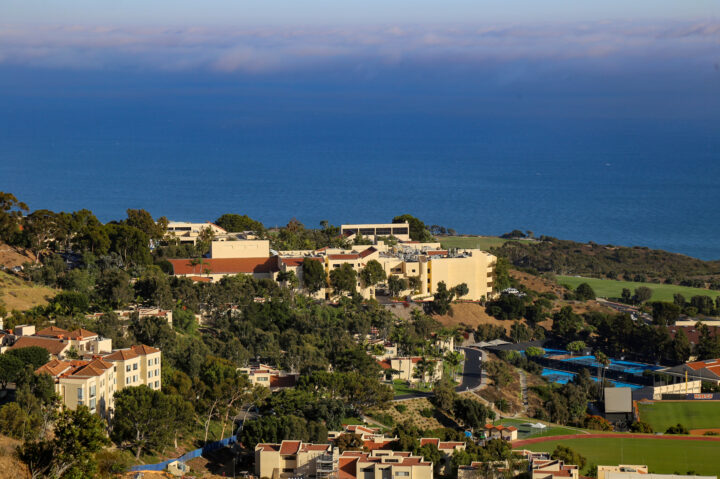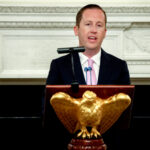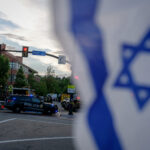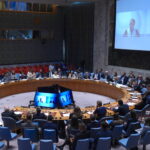Pepperdine University, a private Christian school, has advertised itself as a program free of the anti-Israel politicization endemic on other campuses

GETTY IMAGES
Pepperdine University campus with a view of the Pacific Ocean
As the federal government continues its battles with dozens of colleges over campus antisemitism, the field of Middle East studies has been particularly scrutinized for advancing a one-sided, anti-Israel curriculum contributing to a rise of hostility towards the Jewish state in the classroom and beyond.
Aiming to address that bias, Pepperdine University’s School of Public Policy will launch a new Middle East Policy Studies master’s program this fall. The tuition-free, fully accredited, two-year master’s program on Pepperdine’s D.C. campus is a partnership with The Washington Institute for Near East Policy. It will be funded solely by American citizens — unlike many similar university programs that take foreign funds.
The program comes as critics of the field have long alleged that it imparts to students a one-sided history of the Middle East in which Israel is a perpetual villain, particularly since the Oct. 7, 2023, Hamas terrorist attacks. “We wouldn’t be in these conversations had it not been revealed what’s been happening on college campuses since Oct. 7,” Pete Peterson, dean of Pepperdine’s public policy school, told Jewish Insider.
“It’s evident that there is next to no viewpoint diversity” in the field, Peterson said. “That was revealed publicly in the days following Oct. 7. A lot of the organizing, staffing and in some cases even the funding of [anti-Israel] campus protests came out of centers and institutions in departments of Middle East studies. It wasn’t the engineering department that was going through the barricades.”
For example, a 2024 report from the Harvard Jewish Alumni Alliance took aim at the school’s Center for Middle Eastern Studies for broadcasting the view that “the Palestinian people are innocent victims of Jewish (white) oppression and that known terrorist groups are simply ‘political movements.’” (Two heads of department were let go from their roles in March after the center came under intense scrutiny from the federal government).
“We hope to not just bring people away from other schools where they know they will have to endure, in some cases, years of difficult experiences, but also attract new people into the field because they understand they’re not going to get that ideological — and in some cases antisemitic — approach,” Peterson said.
Robert Satloff, executive director of The Washington Institute and co-creator of the graduate program, told JI that the program intends to “train the next generation of policy makers, analysts and experts,” adding that it was “born out of Oct. 7, although it was percolating in my mind even before that.” The institute has been following critiques of Middle Eastern studies for at least two decades, according to Satloff.
“At many of our elite universities, it’s quite clear that what students are getting as academic fare was not preparing them for the sort of public service we’re going to need in Middle Eastern studies,” Satloff said. “Instead of complaining about the sad state, I decided, let’s create an alternative.”
The program will offer all accepted students this fall full tuition scholarships, which is “our way of saying that merit alone is the sole criterion for admission,” Satloff said, noting the the program’s goal is to be tuition-free in the long term — a decision that will be made after inauguration of the first cohort of students.
“And it’s our way of offering a bit of incentive for those students who may have other options at other universities.”
Satloff reached out to “dozens” of universities across the country in search of a partner. He said that Pepperdine, a private Christian research university with its main campus in Los Angeles, was “eager and had the right approach, which was commitment to viewpoint diversity, where students are not going to be indoctrinated.”
Pepperdine has advertised itself in several fields as a counter to the antisemitism that has increased at universities nationwide since Oct. 7 — and Jewish students are taking note, despite the school’s Christian affiliation.
Jewish students comprise nearly 20% of the 1L class of Pepperdine’s Caruso School of Law.
While Jewish students make up 2% of Pepperdine’s undergraduate population, Jim Gash, the school’s president, wrote in the Jewish Journal last year, “We are a place that is honored by the presence of our Jewish students and faculty — where every year, we have a Sukkah constructed on campus so our observant students can have a place to eat and fellowship on Sukkot; where a Menorah is lit to celebrate the holiday of Hanukkah; and where Jewish students gather together over lunch to discuss the weekly Torah portion.”
The policy school has run a longstanding scholarship for Jewish and Muslim students. “We very much have been committed to being a safe space for people of all faiths,” Peterson said. “Middle East studies in particular have become very secularized and in that secularization you see growing antisemitism.”
Applications for the master’s program are being accepted on a rolling basis until July 25. In the two weeks since the application portal has opened, Satloff said interest in the program is “overwhelming.”
He believes that reception has been sparked by increasing awareness that the “Middle East is likely to remain a key focus of American foreign policy.”
“There was a dip of interest in these issues, but certainly over the last couple of years, young people have been reminded that America is deeply committed in this region and there are important policy interests that we have in this region,” Satloff said, adding that the recent U.S. strikes on Iranian nuclear facilities “confirm that this region will continue to have a tug on American interests far into the future.”






























































